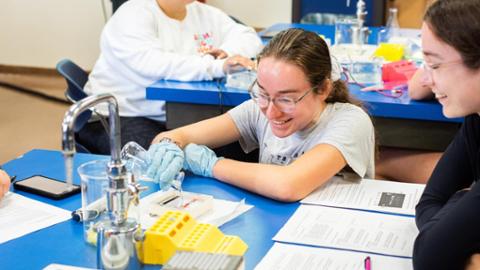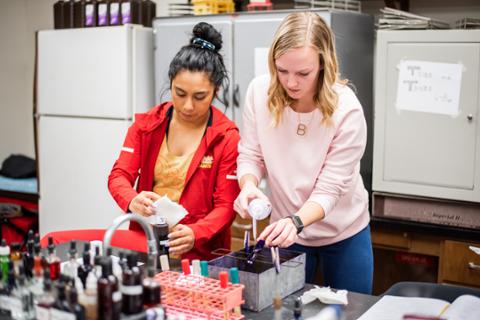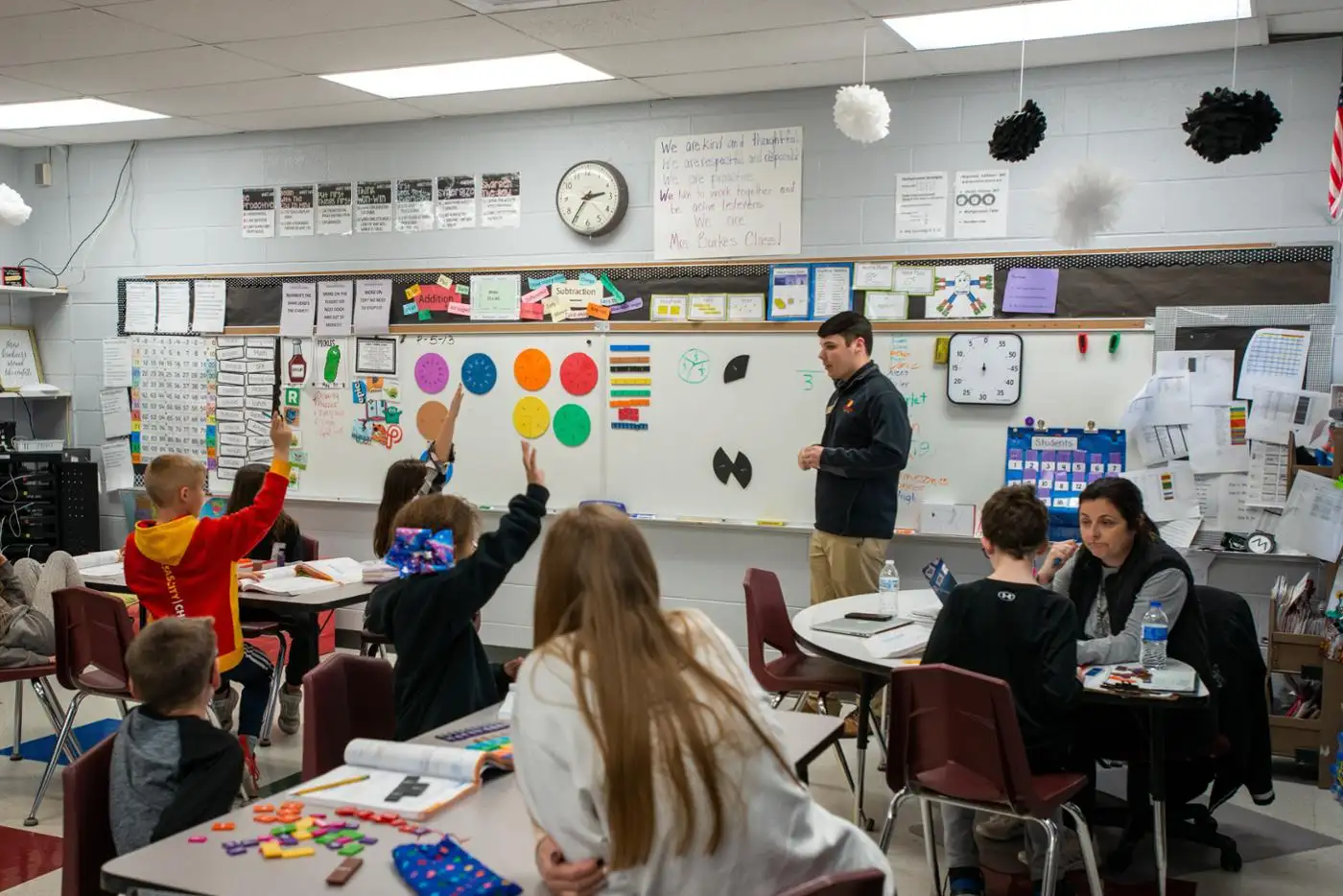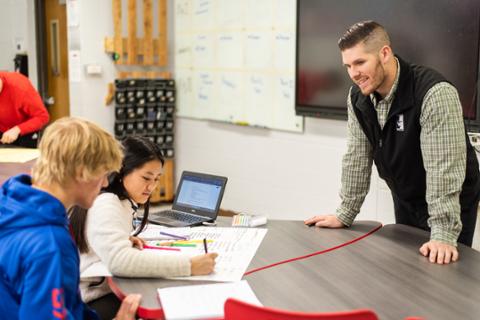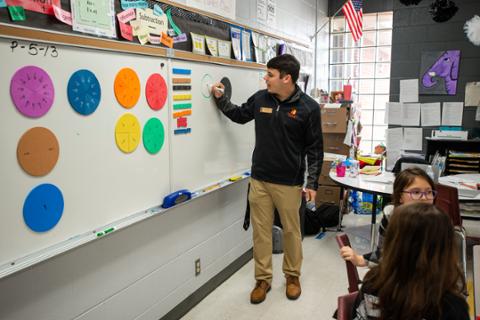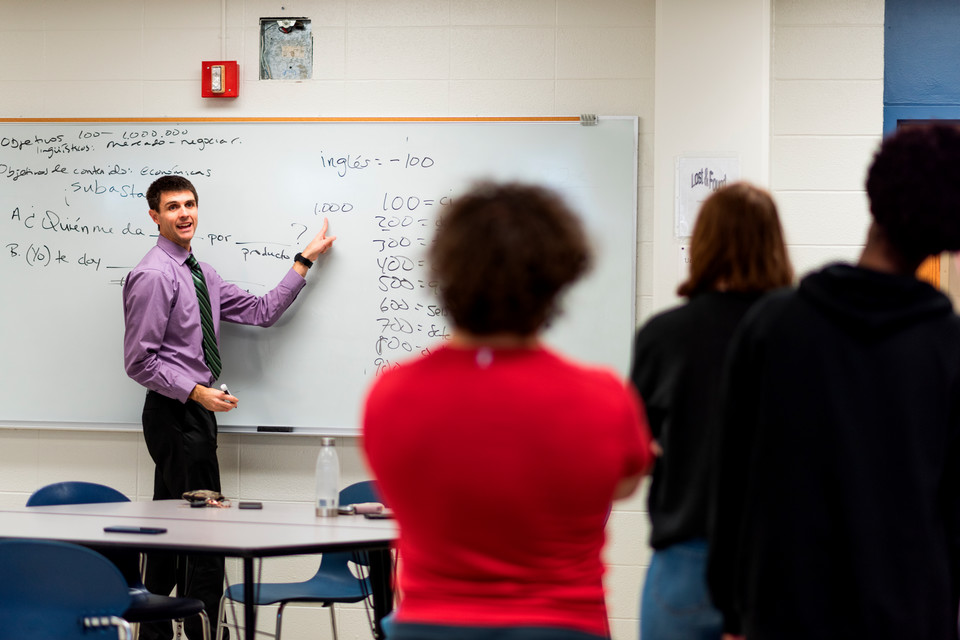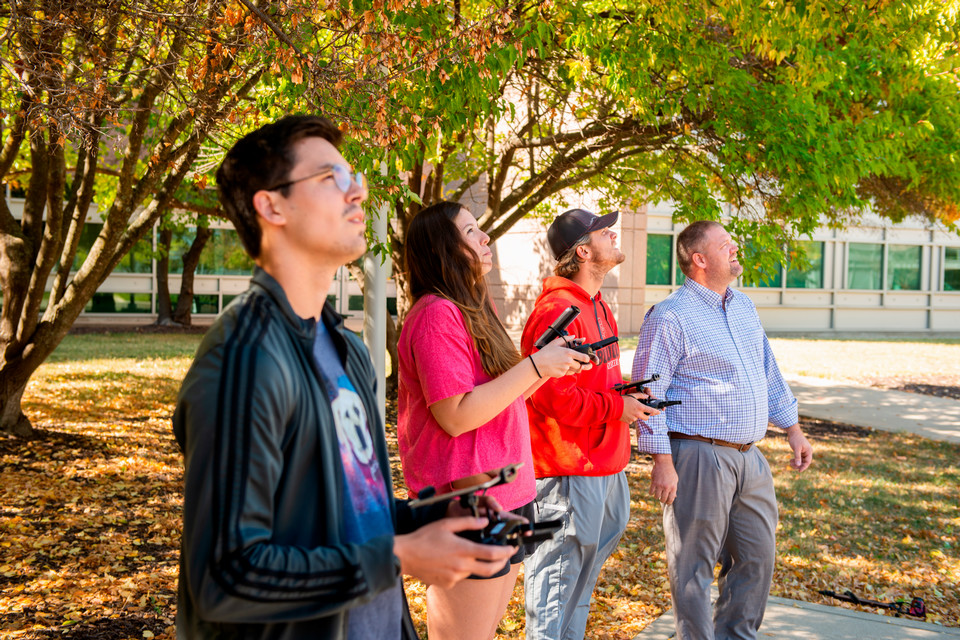TEACHER EDUCATION
Provide transformational experiences for its students and the community
CAEP Accredited Programs for Kansas Teacher Licensure
Nationally Accredited by CAEP
The Educational Preparation Provider (EPP) Unit at Pittsburg State University is proudly accredited by the Council for the Accreditation of Educator Preparation (CAEP), demonstrating our commitment to excellence in teacher education and continuous improvement.
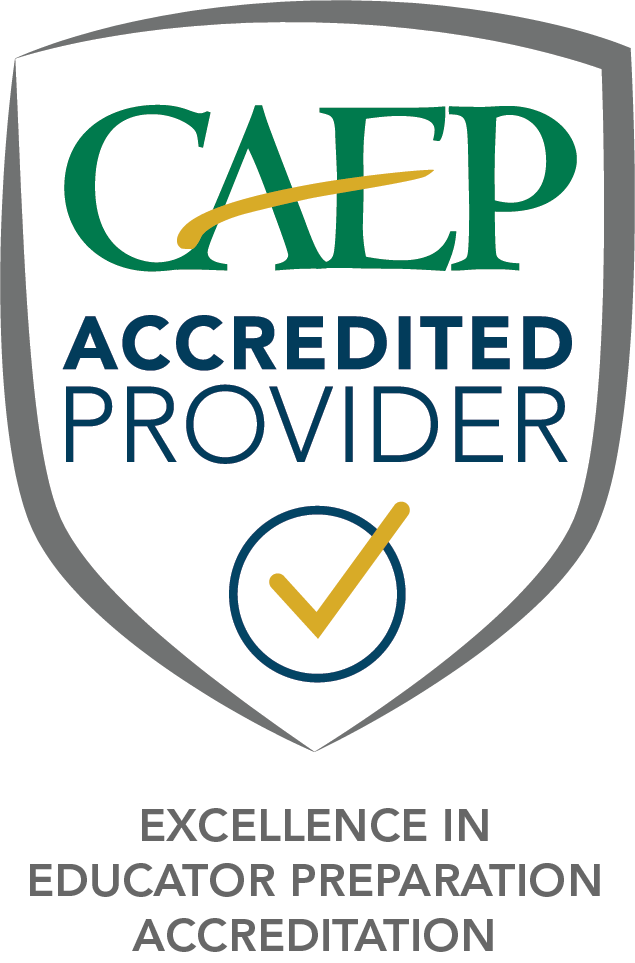

Information and Resources
Admission Requirements for Teacher Ed
Overall Requirements
- Complete the admission application.
- Complete background check.
- Be recommended for teacher education by your assigned advisor, Explorations in Education or Transfer Module instructor and one other college instructor.
- All teacher education candidates must meet a basic skills requirement prior to being admitted to teacher education. The requirement at PSU is an ACT composite score of 22. If your ACT score does not meet this minimum requirement and you have taken the exam at least one time since completing high school, you may meet the basic skills requirement using one of the following options:
Required Scores Exam Required Score ACT Subscores Reading: 16
Writing: 6
Mathematics: 16SAT Minimum combined score of 1120
(for tests taken after March 2016)CORE Reading: 156
Writing: 162
Mathematics: 142Accuplacer Next Generation Reading: 255
Writing: 255
Mathematics*: 263
*Quantitative Reasoning, Algebra, and Statistics - Complete EDUC 261 Explorations in Education with a minimum grade of "C."
- Earn a "C" or better in ENGL 101, ENGL 299, COMM 207, and 3 hours of MATH (above remedial level).
- Cumulative GPA of 2.50.
Forms are available in the Office of Teacher Education, 110 Hughes Hall.
Special Note: These requirements are subject to change.
Transfer Students
Students who have completed an Introduction to Education course at another institution of higher education MAY be eligible to have the course transferred to Pittsburg State University. An additional field experience at PSU may be required (EDUC 307 and/or EDUC 308). An evaluation of any field experience completed at another institution will be required to receive credit for the experience. This evaluation should be completed by the cooperating school-based teacher. For those students eligible for transfer of credit, completion of a non-credit module is required for admission to teacher education. This module will be completed in EDUC 345 Transfer Student Module. Completion of this course is required for all students transferring credit for EDUC 261 Explorations in Education. Transfer students required to take the course will apply for teacher education in the first weeks of the course.
For further information concerning these requirements, contact the Office of Teacher Education, 110 Hughes Hall or phone (620) 235-4489.
Professional Semester Admission Requirements
Elementary and Elementary Education Unified Majors
- Admission to Teacher Education
- Completion of background check
- Approval from major academic department
- Cumulative GPA of 2.50 or higher
- In-major GPA of 2.75 or higher
- Completion of minimum of 30 in-major credit hours
- In-major GPA of 2.75 or higher with no grade lower than a "C"
Special Note: These requirements are subject to change.
Secondary/PK-12 Majors
- Admission to Teacher Education
- Completion of background check
- Approval from major academic department
- Cumulative GPA of 2.50 or higher
- In-major GPA of 2.75 or higher
- Completion of minimum of 30 in-major credit hours
- GPA of 2.75 or higher in 15 hours of professional education courses with no grade lower than a "C"
- EDUC 261 Explorations in Education (including successful completion of field experience)
- SPED 510 Overview of Special Education
- PSYCH 357 Educational Psychology
- EDUC 520 Methods and Materials for Academic Literacy
- Techniques 479
Special Note: These requirements are subject to change.
Professional Dress Guidelines
As a teacher candidate at Pittsburg State University, you will be visiting, interacting, and teaching in several different school classrooms. Dressing professionally is important because you are making your first impression at a school and do not know who will notice and/or remember you and your appearance. You will be representing PSU, the department, and yourself as a teacher. Dressing professionally can make a positive difference.
The definition of professionalism is described as being "distinguished from an amateur". As a teacher candidate, you are more than a student, you are representing the teaching profession. As such, your manner of dress needs to reflect professionalism. You will be provided with guidelines that will assist your success in the classroom.
PSU issued name tags are required to be worn in all school visits.
Testing Information
Basic Skills Requirements
-
All teacher education candidates must meet a basic skills requirement prior to being admitted to teacher education. The requirement at PSU is an ACT composite score of 22. If your ACT score does not meet this minimum requirement and you have taken the exam at least one time since completing high school, you may meet the basic skills requirement using one of the following options:
Required Scores Exam Required Score ACT Subscores Reading: 16
Writing: 6
Mathematics: 16SAT Minimum combined score of 1120
(for tests taken after March 2016)CORE Reading: 156
Writing: 162
Mathematics: 142Accuplacer Next Generation Reading: 255
Writing: 255
Mathematics*: 263
*Quantitative Reasoning, Algebra, and Statistics
Praxis CORE Registration Information
The Core Academic Skills for Educators (CORE) is a computer-delivered exam. The test can be taken at any Prometric Testing Center according to their available schedules. Registration is completed by going to the ETS Praxis website.
Praxis Subject Assessments
The Praxis Subject Assessments are designed to be taken by students and individuals planning to enter the teaching profession as part of the certification process required by many states and professional licensing organizations. The Praxis Subject Assessments should be taken at the end of a student's teacher education program. The test can be taken at any Prometric Testing Center according to their available schedules. Registration is completed by going to the ETS Praxis website.
CAEP Annual Reporting Measures
Measures of program impact, program outcomes and consumer information.
Resources
Student Resources
- Kansas Educator Code of Conduct (PDF)
- 2+2 Transfer Programs
- Transfer Equivalency Guides
- Teacher Education Handbook (PDF)
- Professional Semester Handbook (PDF)
- Education Unit Professional Knowledge Base
- Reporting Child Abuse and Neglect
- Criminal Background Check Instructions
- Health Certificate
- Teacher Education Recommendation Form
- EducateKansas.org
Cooperating Teacher Resources
As a cooperating teacher, you play an essential role in the mission of Teacher Education at Pittsburg State University. The handbook below outlines the roles and expectations of the cooperating teacher as well as those of the teacher candidate.
Thank you for serving as a model for the teacher candidates who may someday be your colleagues. We value the contributions you provide through your experience and perspective. As always, we welcome your input. We hope these materials will help you in this role.
Faculty Resources
Professional Knowledge Base
Pittsburg State University
College of Education
Professional Knowledge Base
THE LEARNER AND LEARNING
Professional educators must understand that learning and development patterns vary among individuals, that learners bring unique individual differences to the learning process and that learners need supportive and safe learning environments to thrive.
- The candidate knows how learning occurs (how learners construct knowledge, acquire skills and develop disciplined thinking processes) and how to use instructional strategies that promote individual growth.
- The candidate understands that cognitive, linguistic, social, emotional and physical development influences learning.
- The candidate understands and identifies differences in approaches to learning and performance and designs experiences that incorporate individuals’ strengths to promote growth.
- The candidate understands students with exceptional needs and knows how to use strategies and resources to meet these needs.
- The candidate knows how to access information about the values of diverse cultures and communities and how to incorporate languages, experiences, cultures and community resources into practice.
- The candidate understands how to manage the learning environment by organizing, allocating and coordinating the resources of time and space.
- The candidate knows how to design experiences using strategies that enhance learner motivation and engagement.
- The candidate understands the processes needed to foster a respectful learning community.
CONTENT
Professional educators must have a deep and flexible understanding of the field and be able to draw upon the central concepts and structures of their discipline as they work with learners. They integrate cross-disciplinary skills (e.g., critical thinking, problem solving, creativity and communication) to help learners apply content to propose solutions, forge new understandings, solve problems and imagine possibilities. Professional educators connect information to local, state, national and global issues.
- The candidate understands that learners should question, analyze and understand concepts from diverse perspectives.
- The candidate has a deep knowledge of student content standards and learning progressions in the discipline(s).
- The candidate knows how to use supplementary resources and technologies effectively to ensure accessibility and relevance for all.
- The candidate understands how disciplinary knowledge can be applied as a lens to address local and global issues.
- The candidate realizes that content knowledge is not a fixed body of facts but is complex, culturally situated and ever evolving. S/he keeps abreast of new ideas and best practices in the field.
- The candidate knows major concepts, assumptions and debates that are central to the discipline.
INSTRUCTIONAL PRACTICE
Professional educators understand and integrate assessment, planning and instructional strategies in coordinated and engaging ways for effective practice. They understand how to design, implement, interpret and communicate results from a range of assessments.
- The candidate knows how to engage learners in multiple ways of demonstrating knowledge and skills as part of the assessment process.
- The candidate understands the positive impact of effective descriptive feedback and knows a variety of strategies for communicating this feedback.
- The candidate knows how to engage learners actively in the assessment process and to develop each learner’s capacity to reflect on and communicate about their individual progress.
- The candidate understands the theories and processes of curriculum design (appropriate sequencing, developmentally appropriate instruction, builds on learners’ prior knowledge and experiences).
- The candidate understands the process for aligning instruction and assessment with learning targets.
- The candidate understands how theory, research and best practices impact ongoing planning and instructional practice.
- The candidate knows how to engage learners in using technology tools and a range of skills to access, interpret, evaluate and apply information.
- The candidate knows how to incorporate a variety of strategies that stimulate the cognitive processes associated with various kinds of learning (e.g., critical and creative thinking, problem framing and problem solving, invention, memorization and recall).
- The candidate knows how to apply a variety of developmentally, culturally and linguistically appropriate instructional strategies to achieve learning targets.
- The candidate knows how to analyze assessment data to understand patterns and gaps in learning, to guide planning and instruction and to provide meaningful feedback.
PROFESSIONAL RESPONSIBILITY
Professional educators create and support safe, productive learning environments. They must engage in meaningful and intensive professional learning and self-renewal by regularly examining practice through ongoing study, self-reflection and collaboration. Professional educators contribute to accomplishing their school’s mission and goals and demonstrate leadership by modeling ethical behavior, contributing to positive changes in practice and advancing their profession.
- The candidate knows how to use information and technology ethically, legally and safely.
- The candidate understands and knows how to use a variety of self-assessment and problem-solving strategies to analyze and reflect on his/her practice and to plan for adaptations/adjustments.
- The candidate understands laws related to learners’ rights and teacher responsibilities (e.g., IDEA, FERPA, mandated reporting, etc.).
- The candidate understands schools as organizations within a historical, cultural, political and social context and knows how to work with others across the system to support learners.
- The candidate knows how to contribute to a common culture that supports high expectations for student learning.
- The candidate understands the expectations of the profession including codes of ethics, professional standards of practice and relevant law and policy.
- The candidate knows how to communicate effectively with all members of the learning community.
Interested in becoming a teacher?
Our Community.

